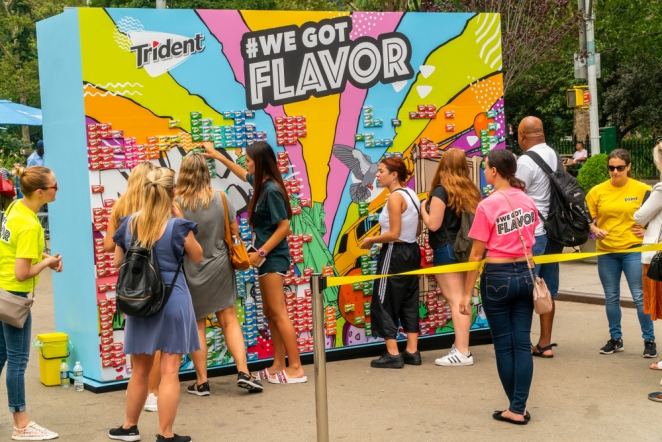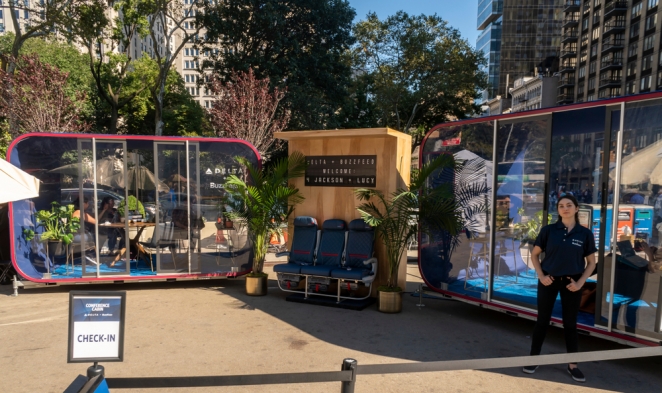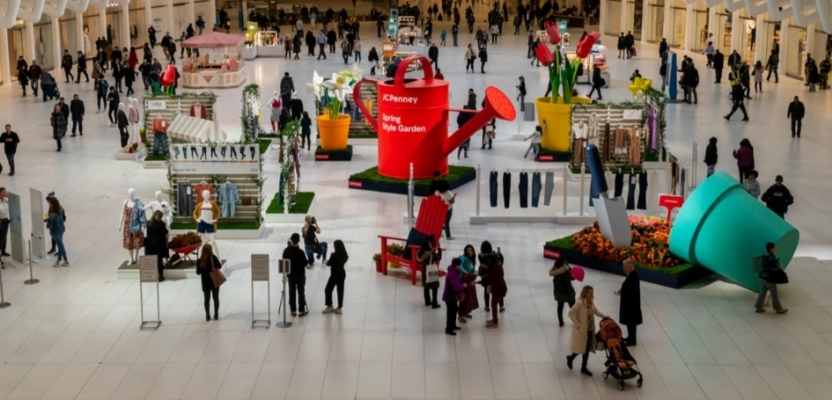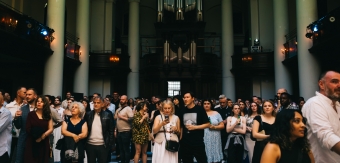As a concept, experiential marketing is all about taking risks and doing whatever it takes to create a bond between the consumer and the brand. An experience, after all, can be a thousand different things to a million different people but it’s how we engage with that experience and how it engages with us that define how we feel about the ones behind it. That’s why choosing the right experiential agency is such a crucial decision. They are going to be the ones deciding how people interact with your brand physically and emotionally.
For the uninitiated, experiential marketing might look a lot like event marketing and it does tend to be focused on events. But it’s so much more than that. These are not events, they are experiences (the clue is in the name) that can be anything from a product launch to a music festival and everything in between.
To explore the realities and practicalities of choosing the right experiential agency, we spoke to two of the market’s leading lights: Tim Collett is the global head of events for WRG, a division of The Creative Engagement Group. He has 15 years worth of experience in the public event’s sector, having worked for global brands such as Samsung, P&G and Lexus. Simon Beddoe, meanwhile, is Head of Business Development at Imagination. He’s worked at some of the biggest and best agencies in the world over a 15-year career.
Together, they helped us digest and unpack the steps and considerations a brand should be making when choosing the best experiential agency that chimes with their personality and their expectations.

Asking the right questions
All good relationships are based on a foundation of respect and trust and the same is true of agencies and clients. Tim believes that being on the same page means asking the right questions of each other.
“There are plenty of vital pieces to the puzzle it’s tough to get out of a typical request for proposal response,” he says. “Is this an agency I can trust and get along with? How do our cultures and values match up? Do we have the same ways of working? Do we understand each other? More to the point, do I actually like spending time with their people?”
These are not questions that can be answered in a few sentences of course and this is why you should never agree to a partnership on the first meeting unless you really hit it off.
Simon, meanwhile, believes there are three questions that every brand should be asking their potential experiential agency partner:
- Can they robustly demonstrate expertise in solving my problem or challenge?
- Do I feel they can give me the level of service and professionalism I require?
- Do we have good chemistry and do I want to spend time with them on this journey, long or short?

An experienced hand or new blood
Simon essentially believes that a good balance needs to be struck between experience and new blood. Because: “There is no substitute for an agency that can prove they have solved your problem time and time again.”
On the other hand, if a client trusts implicitly in the collective experience of the individuals at a new experiential agency – that can be just as strong. Not only that but the industry needs innovation to thrive, so going outside of the incumbents or giving opportunities to those with lesser credentials in a specific field both encourages better ideas and moves us all along.
“However,” he adds, “be mindful of where you can and cannot afford to take this risk – newcomers have to grab attention so can sometimes over-promise and under-deliver.”
According to Tim, while experience counts for a lot, particularly in a sector as complicated as healthcare, sometimes giving a new agency a chance rather than settling into old habits can be worthwhile. The skill of taking complex information and distilling it down into inspiring content is transferrable, after all.
He explains: “A switch can sometimes give clients a value-add, by offering inspiration from other, more progressive industries.” He does concede, however, that “wowing your audiences with new, exciting concepts and technologies is more comfortable when you can see a proof of concept in action elsewhere.”

In-house vs third-party
When it comes to the benefits of third-party thinking, Tim explains: “If clients only use in-house resources, they’re missing out on the fresh thinking and exciting new ideas that come from an outside perspective.”
This is because new creative ideas always happen when different creatives with different backgrounds work together. He adds: “Outside agencies also give clients the scalability and agility they need to ensure event calendars don’t become defined by resourcing, rather than the needs of their people.”
The major benefit of sticking in-house, however, is that you are being steered by familiar hands and there are never going to be any surprises. Simon explains: “In some instances, in-house delivery is a great option, with many outstanding professionals working for the client entity. With a third-party agency, it can also be awkward when the scope changes dramatically from what was initially briefed.”
However, when you need to innovate, bring new ideas and partnerships, you need diversity of experience and agencies can really deliver here. Simon adds: “Agencies provide an objective point of view on your brand, that cannot be done by an in-house team and is only something that can be achieved externally. You also can’t have every specialist that is needed in-house and so you need an agency to bridge those gaps.”

Making the connection
A relationship forged on unsteady ground is never going to be able to flourish and that’s why pitching is such a vital component of the journey. As for whom should be the one pitching to whom, Tim feels it’s the clients that should be doing the heavy lifting.
“Clients should generally tender for their agency of record.” He explains. “This allows clients to test that trust. It’s crucial the client knows that they’re still working with the best agency for their needs and that they benchmark on costs and creative.”
He adds, however, that tendering for each individual project is not only time-consuming but can erode trust.
Simon, on the other hand, has a more utilitarian approach and says that Imagination finds their efforts are “about 50/50” when it comes to inbound or outbound work. Either way, he feels that “being upfront and honest can set the tone of the relationship going forward. It’s all about communication, whether that’s in-house or out-house.”
Budgeting in the time of COVID
While budget is always going to be a consideration, there is a school of thought that posits good, intelligent creative ideas can be applied to any budget. Tim believes “it’s not really about the money. It’s about matching the budget to the production values, and the production values to the client’s expectations.”
Of course, while this might be the case, it’s also vital that clients disclose the budget when experiential agencies are pitching. Because “being offered fabulous, creative ideas you can’t afford is a road that inevitably leads to frustration for both the client and the agency.”
Simon also feels that budgetary concerns should be sorted out as soon as possible and that transparency is key. He says: “You need to know that they’ve realistically budgeted your scope because otherwise they might have underpriced it to win your work and they could end up charging more later.”
Simon feels that COVID has changed the game as far as budgeting is concerned, as it’s been a notoriously difficult time for any business operating within experiential circles. But from necessity comes invention.
He says: “We have innovated to emerge stronger, smarter and more creative. Our client relationships have grown because we have shared the challenges and collaborated more on finding new ways of working.”

And that sounds like true experiential thinking to us.





